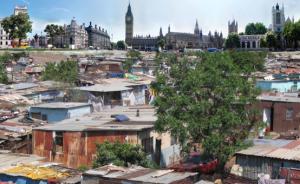Shadow cities: realities and representations

More than a billion people live in improvised dwellings or shanty towns in the early twenty-first century. Whether in inner cities or on the outskirts of a metropolis, these settlements have been dubbed “Shadow Cities” by Robert Neuwirth. Neuwirth takes a relatively positive view of the economic and cultural creativity of such places. In contrast Mike Davis has a more apocalyptic vision of a fast developing “Planet of Slums”. For Davis such habitations offer little hope and potentially cataclysmic danger in a post-industrial and neo-liberal world.
What light can historical investigation shed on what have often been Manichean representations of the shanty town as either a place of hope or a site of irredeemable misery? Most research and writing on this phenomenon has focused on contemporary developments. The aim of this conference is to investigate and explain the historical existence of Shadow Cities, their varying nature in different historical and geographical circumstances, the living conditions and experiences of their inhabitants, and the perceptions or representations of such settlements.
Keynote speakers: Derek Keene (IHR), Nandini Gooptu (Oxford), Alan Mayne (University of South Australia) and Susan Parnell (University of Cape Town).
Panel sessions: 'Possibilities and constraints in the historical agency of residents'; 'South American "Ciudades en la Sombra"'; 'Shadow cities in socialist Eastern Europe'; 'Creating or regulating shadow cities for "indigenous populations"'; 'Unexpected shadow cities?'; and 'Shanty towns, spatial urban geography and transport'. Countries and cities explored include: Argentina, Caribbean Colombia, Yugoslavia, the USSR, India, Santiago de Chile, Cape Town, colonial Khartoum, Nairobi, Cairo, Athens and New Brunswick (Canada).
